Victoria records 288 coronavirus cases in nation’s worst virus spike
Millions of Melburnians are being urged to wear masks in a bid to drive down the city’s skyrocketing number of new coronavirus cases, with 288 in the past 24 hours marking its biggest climb since the pandemic began.
Coronavirus
Don't miss out on the headlines from Coronavirus. Followed categories will be added to My News.
This coronavirus article is unlocked and free to read in the interest of community health and safety. Get full digital access to trusted news from the Herald Sun and Leader for just $1 for the first 28 days.
The Andrews Government is urging residents in metropolitan Melbourne and Mitchell Shire to wear masks when they are outside their home and physical distancing is not possible.
More than two million reusable masks will be ordered and a further one million disposable masks ordered.
Mr Andrews said mask use was encouraged but not mandatory.
“It’s not compulsory, we are simply asking that if you can wear a mask where you can’t distance, that is exactly what we would like you to do,” he said.
“That’s a relatively small contribution but one that could make a really big difference.
“No mask, even surgical grade, reduces the risk of infection to zero. There is always some inherent risk.
“Masks will be a feature of our response to the pandemic for the foreseeable future, (which may be) many, many months.”
VICTORIA’S NEW RECORD-BREAKING VIRUS SPIKE
Victoria has recorded 288 new coronavirus cases today, the biggest daily increase in COVID-19 case numbers recorded in Australia.
The record number has pushed the state’s active case tally to 1172.
Forty seven of those cases are currently in hospital, with 12 in intensive care.
Twenty six of the new cases are linked to known outbreaks, while 14 of the new cases are in healthcare workers.
The state’s chief health officer said the daily total was a “pretty ugly number”.
Professor Brett Sutton said there was a significant amount of community transmission in Craigieburn, Roxburgh Park and Truganina.
“There are some postcodes that are really significant and showing up in terms of transmission.
“People in those areas in particular should bear in mind that any symptoms, really, should prompt you to be testing.
“You should not be seeing other people. You should be at home, you should be isolating and getting tested.”
Prof Sutton said it would be between one and two weeks before the effects of the lockdown were reflected in the case numbers.
“We may well get worse numbers to follow,” he said.
“It is an indication of the transmission that was occurring a week ago showing up in the numbers today and we may well see it worsen before it gets better.”
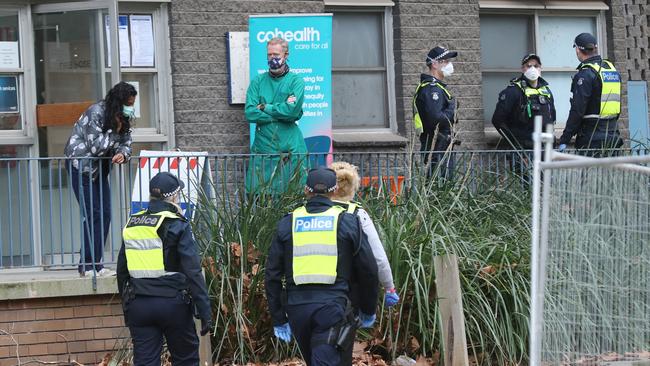
INCREASE IN DEATHS PREDICTED
Prof Sutton said the increase in case numbers would bring more deaths, with COVID patients in hospital the most vulnerable.
“We will see an increase in hospitalised and ICU cases and in deaths in the coming days because of the spike that we have seen in recent days,” he said.
“The ICU numbers have gone up significantly and the hospitalised numbers have gone up significantly.
“That usually lags the increase in numbers by a week or two as people develop the worst manifestations of the illness.
“(An increase in deaths) is not because the virus is worse, it is because we’re seeing people who are most vulnerable, the elderly, those with chronic illness, coming down with infection.”
Prof Sutton said an increase in patients in intensive care paled in comparison to figures in the US, but still needed to be reduced.
“(Intensive care units) are dealing with it within their usual capacity but it is not an insignificant number to have 12 in ICU, even in a distributed ICU network in Melbourne,” he said.
“It is certainly within their capacity but we have to bear in mind that we need to turn this around. There are places in the world that are about to be overwhelmed in their ICU capacity, Texas and Arizona and Florida are on the edge in that regard.
“Our numbers are the numbers that the US gets every 10 minutes.
“We are still in a fortunate position and we have gone to a lockdown at this juncture in order not to have those kind of pressures manifest in our system.”
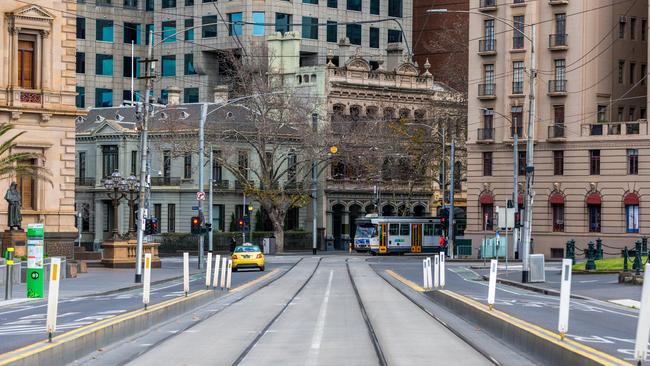
GROWINGS CLAIMS AGAINST COVID-19 TRACKING APP’S EFFICIENCY
A Melbourne web app developer claims failings in the Government’s COVID-19 tracking app have “dangerously exposed” him and his 15 staff to the wildly infectious disease.
Anushka Banbara said he and all of his workers were forced to get tested for coronavirus immediately when one of his employees came into close contact with a positive case on June 25.
Mr Banbara said his staff member was out for dinner with two others at a Caulfield restaurant for more than an hour.
“The next day my worker was told by one of his dinner guests there had been a positive case at his gym and he needed to be tested for COVID-19. That person and then my staff member tested positive,” he said.
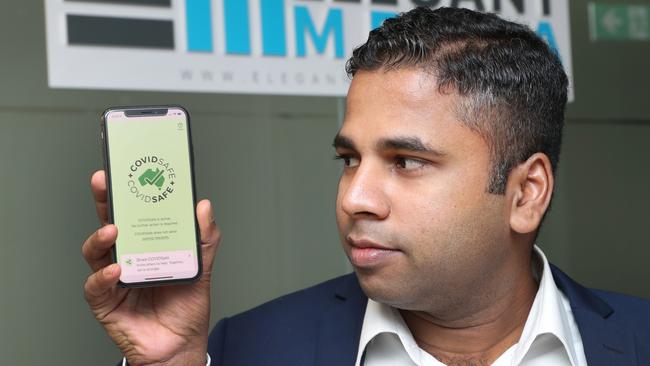
In that time, Mr Banbara’s team had worked together in their Clayton office, but no one else tested positive.
COVIDSafe, which was made available to Australians in April, was developed to help stop the spread of coronavirus.
Once installed, the app uses Bluetooth to check if any other phones with the app installed are within 1.5m of you.
When two phones detect each other they exchange a “digital handshake” meaning each device shares an anonymous ID to log the close contact.
The data is sent to a national store where, if someone reports positive, health officials then phone contacts to tell them they may have been exposed to coronavirus.
But Mr Banbara said he and none of his staff had been contacted by any health authorities.
READ THE FULL VERSION OF THIS STORY, HERE
SO WHAT COMES NEXT?
Prof Sutton said there was no clear plan for a stage four of stay-at-home restrictions.
“There is no easily definable next stage for clamping down even harder,” he said.
“We absolutely have to see how these restrictions play out, understanding that there will be a delay in the numbers.
“It is under review every day.
“It really depends on whether it is a broad growth in numbers or whether it’s an area where we just need to focus testing and communication and engagement.
“No one number will necessarily be the decision point for harder lockdown.”
Prof Sutton said the Geelong area was being reviewed daily.
“We need to know where the cases are occurring, if community transmission is established in Geelong, it would make the case stronger,” he said.
“We also need to bear in mind how much the western suburbs of Melbourne have increased in cases and how much commuting for work purposes, essential purposes is coming from Geelong.
“I would say to those in Geelong: you need to be as mindful of testing and symptoms as anywhere else in Victoria and if you’re commuting for essential purposes, especially to the western suburbs of Melbourne, bear in mind all of the things that you need to do to protect yourself.”
The Premier urged Victorians to “do the right thing”.
“If we all moderate our behaviour, if we stay at home and we follow the rules and get tested when we’re sick, if we don’t go out and about our business as usual if we are sick, then we will pull this up, we will bring a sense of control to this,” he said.
“It won’t happen by accident and it won’t happen just because of luck. It will be the contribution each of us make.
“If you don’t want restrictions to be on any longer than they need to be, if you want to get to that COVID-normal as quickly and safely as possible, we all have a part to play.
“Let’s make sure we’re all vigilant this weekend and playing our part.”
SCHOOLS WORKING TOWARDS REMOTE LEARNING
A range of measures will be rolled out in Victorian schools for when students return from holidays.
Prof Sutton said it was imperative that students with even the mildest symptoms didn't attend school, but that their education not be impacted.
“We are working on a preparedness to have remote learning, as required,” he said.
“Students coming back will have all of the requirements embedded in those schools as they return.
“The focus on making sure that anyone with the mildest of illness doesn’t turn up is the key one.
“The understanding that school classrooms can’t allow for 1.5m distancing for all students all of the time is a reality, but they will do that to the extent that they can.
“Temperature screening will be part of checking for all students.
“That temperature screening is not just checking for temperatures, it is a prompt for all students that they shouldn’t be turning up if they have symptoms. They will be sent home.
“They are the key interventions for kids returning to school.
“The fact that it will only be potentially year 11 and 12 students means the pressure is on public transport and the pressures of gathering en route to school won’t be so great.”
Prof Sutton said face masks would not be required in schools.
“I don’t think masks are feasible in schools," he said.
“Kids can’t necessarily wear the masks in the same way that adults can.
“Teachers can’t really teach with masks.
“I think everyone in schools should feel free to bring a mask if they feel comfortable with it – teachers in the common room, or individual students if they so choose.”
ENORMOUS TASK AHEAD FOR CONTACT TRACERS
The health department is tracing more than 5000 close contacts of people who have tested positive.
“The work for close contacts is being done and we are now at daily levels that were similar to the peak in Australia,” Prof Sutton said.
“It is stretching contact tracing activities … For contact tracers, it is a relatively routine business to check in with those in quarantine and make sure they haven’t developed symptoms and make sure they’re adhering to the quarantine requirements.
“The real work is done in the long-form interview with cases.
“We have very professional individuals in the team doing that to identify all of the close contacts, all of the potential sensitive settings that those individuals go to.
“That is a more specialised work force and we have got that work force and they are doing a fantastic job.”
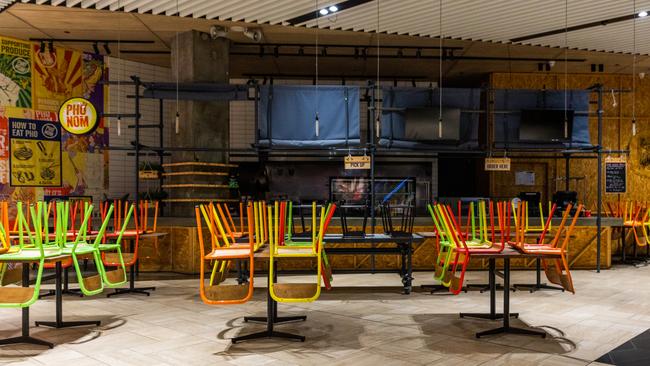
KFC BIRTHDAY PARTYGOERS AMONG FINE RECIPIENTS
Police have issues 12 infringements from 5500 vehicle intercepts, and handed out other infringements for blatant breaches of stay-at-home directives.
Victoria Police Chief Commissioner, Shane Patton, said a birthday party in Dandenong ended up costing partygoers $26,000.
“We had ambos who were at a KFC at Dandenong and while they were getting something to eat, they saw two people in there and they were ordering 20 meals at 1.30am this morning,” Commissioner Patton said.
“They spoke to the people at KFC and subsequently, there was a report made to us.
“We got the registration number of the car and we followed through and went to that address in Dandenong.
“It was a town house. When we went in there was two people asleep but there were 16 others hiding out the back and they just got the KFC meals at a birthday.
“That is absolutely ridiculous, that type of behaviour.
“It is an expensive night when you think apart from the KFC, we have issued 16 infringements at that amount, that is $26,000 that birthday party is costing them.
That is a heck of a birthday party to recall. They will remember that one for a long time.”
Commissioner Patton said another four infringements were given out to sex workers in Glen Waverley.
“In Glen Waverley we had a report through Crime Stoppers where there was a large amount of men frequenting an address, going in and out,” he said.
“Subsequently we had our sex industry co-ordination unit attend and there were four sex workers in there.
“They were on a break when we attended. They have been issued infringements.
Commissioner Patton also highlighted people visiting Mornington to whale watching as “totally unacceptable, a total breach of the distancing rules”.
“That conduct won’t be permitted,” he said.
“If the public don’t comply, we will continue to ramp up our infringement issue.”
A Docklands driver was also stopped and fined in Lang Lang for trying to get to Phillip Island.
NO PLANS TO RESUME HOTEL QUARANTINE
The Premier said international flights would continue to be diverted away from Melbourne.
“We will not be taking flights for the foreseeable future and those flights will need to be diverted to other capital cities,” he said.
“Given we have had the better part of 20,000 returned travellers processed here, many of whom weren’t from Victoria, I think it is fair to say others will have to deal with that issue because we have got our own set of challenges that we have to deal with, contact tracing and those important things.”
SUPPORT PACKAGE ANNOUNCED FOR VICTORIAN BUSINESSES
The Andrews Government earlier announced it will roll out a $534 million support package for businesses impacted by the next wave of coronavirus restrictions.
Treasurer Tim Pallas on Friday announced a raft of new measures including cash grants for struggling businesses and relief for tourism operators who will no longer receive Melbourne-based visitors.
Hard-hit hospitality businesses will have access to $30 million from a dedicated fund while $26 million will provide mental health support for those running a small business.
A $40 million capped fund for regional tourism businesses will be used to cover the cost of refunds and marketing campaigns.
WOOLWORTHS WORKER TESTS POSITIVE
A worker at Woolworths Werribee Plaza has tested positive for COVID-19.
Workers at Pacific Werribee shopping centre were notified on Thursday night an employee at Woolworths had returned a positive test and the store would be closing Thursday night.
The person who tested positive was last working in the supermarket on July 4, but returned the positive test on Thursday.
Any customers who shopped at the supermarket on July 4 and have since felt unwell or displayed any symptoms are urged to contact the health department.
The Woolworths store has reopened this morning.
– James Mottershead
VICTORIAN CASE NUMBERS BY COUNCIL AREA
STATE’S TWO LARGEST CLUSTERS LINKED
Victoria’s two largest coronavirus outbreaks have been linked together, potentially also combining with at least two other major clusters.
The 113-case Al-Taqwa College cluster and the 159-case public housing towers outbreak have been strongly connected by health investigators, though it remains unclear which may have become infected first.
Spiralling transmissions among the two outbreaks saw both surpass Cedar Meats’ 111 cases on Thursday to become the state’s largest sources of COVID-19.
The Department of Health confirmed in June the Al-Taqwa College outbreak is also linked to previously identified family clusters in Truganina and Sunshine West.
But with students attending the college associated with the Truganina and Sunshine West family outbreaks, as well as the North Melbourne and Flemington housing estates, it may never be known who infected who first.
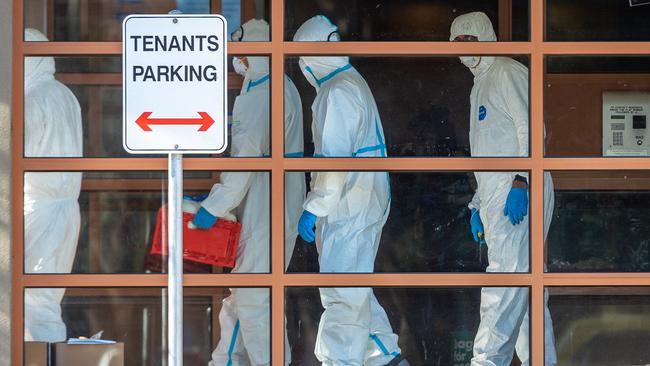
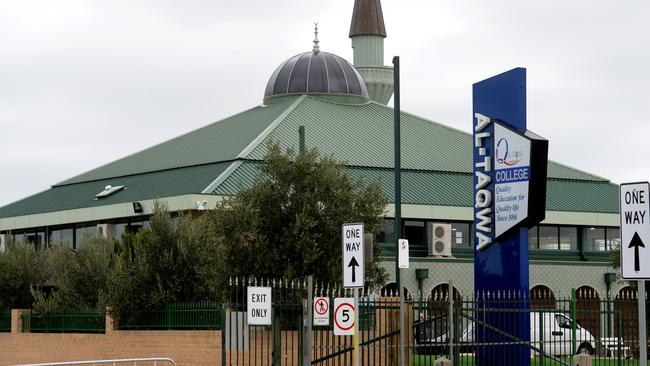
Victoria’s Chief Health Officer Brett Sutton on Thursday confirmed there was an epidemiological link between Al Taqwa and the towers.
“It might have gone in one direction, it might have gone in the other direction,” Prof Sutton said.
“There may well be multiple importations into these towers – indeed, there might have been multiple importations into Al-Taqwa College.
“These are communities that cross over between Truganina and these towers.”
Despite the massive scale of the outbreaks, it is still less than a fortnight since COVID-19 was first detected at Al-Taqwa College, so genetic sequencing has not yet been able to establish its exact strain or source.
Although the school’s first case was confirmed in a teacher on June 27 – the first day of school holidays – investigators believe coronavirus had been introduced to the school much earlier, probably among senior students with no or only mild symptoms who never sought tests.
Department of Health epidemiologists say the teacher had worked for two days while infectious, however the speed of infections over the following week makes it likely the virus had already spread further within the school community before Term 2 wound up.
On June 30 all students and staff were ordered isolate to seek coronavirus tests, prompting a flood of positive results.
At the same time the Truganina family outbreak blew out from three cases on June 29 to 16 on July 6.
Although the first cases of coronavirus were detected in the public housing towers last week, it was only on Sunday the Andrews Government took the extraordinary step of confining more than 3000 residents to their apartments.
On Thursday another Truganina cluster emerged – this time at the Catch.com Distribution Centre – with four cases.
While VCE students will return to Victorian schools from Monday, it remains unclear what impact the ongoing outbreak will have on Al-Taqwa College.
Michelle Green, chief executive of independent Schools Victoria, said it was up to individual schools to be accountable to their governing boards and parent communities.
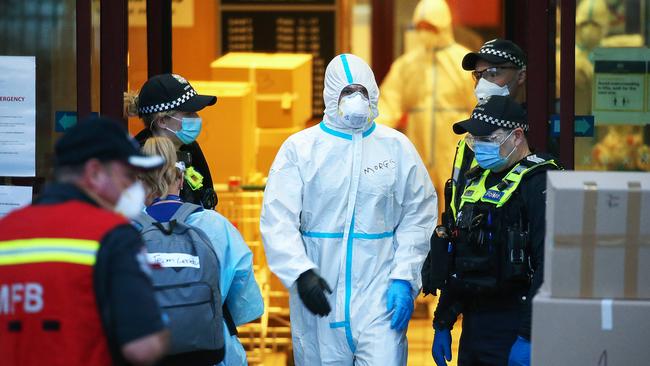
VIRUS-PLAGUED TOWER REMAINS LOCKED DOWN
Public housing residents in one Melbourne tower will be forced to stay in lockdown for a further nine days amid concerns the infection rate within the building could rise higher than 25 per cent.
Up to 53 residents have tested positive at 33 Alfred St, in North Melbourne, prompting Daniel Andrews to announce the tower will stay in quarantine for the full 14 days in a bid to stem the spread.
Meanwhile, towers at 12 Sutton Street and 76 Canning Street in North Melbourne and 12 Holland Court, 120 Racecourse Rd, 126 and 130 Racecourse Rd, in Flemington, were due to reopen at 11.59pm on Thursday night.
It comes after a massive testing blitz of 2515 tower residents in five days.
“The case numbers within these towers confirm just how rapidly – and dangerously – coronavirus can spread,” Premier Dan Andrews said.
Chief Health Officer Brett Sutton supported the move to lockdown one tower for the full 14-days saying the infection rate is likely to rise to more than double in the coming days.
Two other towers at 9 Pampas St and 159 Melrose St, in North Melbourne, that were also in lock down, had no cases found and reopened at 5pm on Thursday.
– Alex White, Josh Fagan, Ian Royall
HOW TO MAKE SURE YOU’RE WEARING A FACE MASK CORRECTLY
SKI SEASON HALTS DUE TO LOCKDOWN
Ski resorts at Mount Hotham and Falls Creek have been shut due to Victoria’s coronavirus lockdown.
Lift operations at the two sites had opened this week after a delayed start to the season.
But all ski-lifting operations were suspended on Thursday for at least six weeks, in line with the stage three restrictions.
Guests and passholders were told they would get a refund.
The company that manages the two sites, Vail Resorts, said they would follow the advice of health authorities to determine if it was feasible to reopen later in the season.
Vail Resorts chief operating officer Peter Brulisauer said in a statement: “We did not make this decision lightly as we know our employees, guests and the communities where we operate have already endured so much hardship this year.”
“We recognise this is incredibly disappointing to our guests and pass holders, including those who have made reservations at Hotham and Falls Creek this season. We thank them for their patience and understanding as we continue to navigate this incredibly challenging time.”
He said reservations for lift tickets, ski and ride lessons and rental bookings would be cancelled and fully refunded.
Perisher will remain open and is unaffected by this decision, operating in accordance with COVID-19 restrictions in NSW.
– Josh Fagan
RELATED NEWS
STRUGGLING MELBOURNE TRADERS BLAME ANDREWS
THINGS YOU CAN DO DURING LOCKDOWN
CONCERNS RAISED OVER SCOPE OF HOTEL INQUIRY
Serious concerns have been raised about the scope and powers of a judicial inquiry investigating Victoria’s bungled hotels quarantine system.
The Herald Sun understands that hearings will be held in public, and that ministers, departmental staff and security guards involved will be called to testify.
But unlike a royal commission, witnesses can refuse to answer questions for fear of self-incrimination.
The inquiry also will not have the power to issue search warrants or seize documents, like that of a royal commission.
Questions have also been raised about the inquiry, to be headed by former judge Jennifer Coate, being hindered by its terms of reference.
– Shannon Deery, James Campbell, Matt Johnston, Tom Minear
MASK-WEARING EDUCATION CAMPAIGN COMING SOON
Victorians in lockdown are being urged to wear masks if they can’t physically distance when in public.
The Australian Health Protection Principal Committee now recommends all Victorians in metropolitan Melbourne or Mitchell Shire to wear a mask if unable to socially distance outside. The Australian Medical Association has adopted a similar stance.
There has been significant debate on the benefits of mask use but the advice has changed this week as Victoria’s coronavirus tally spirals out of control.
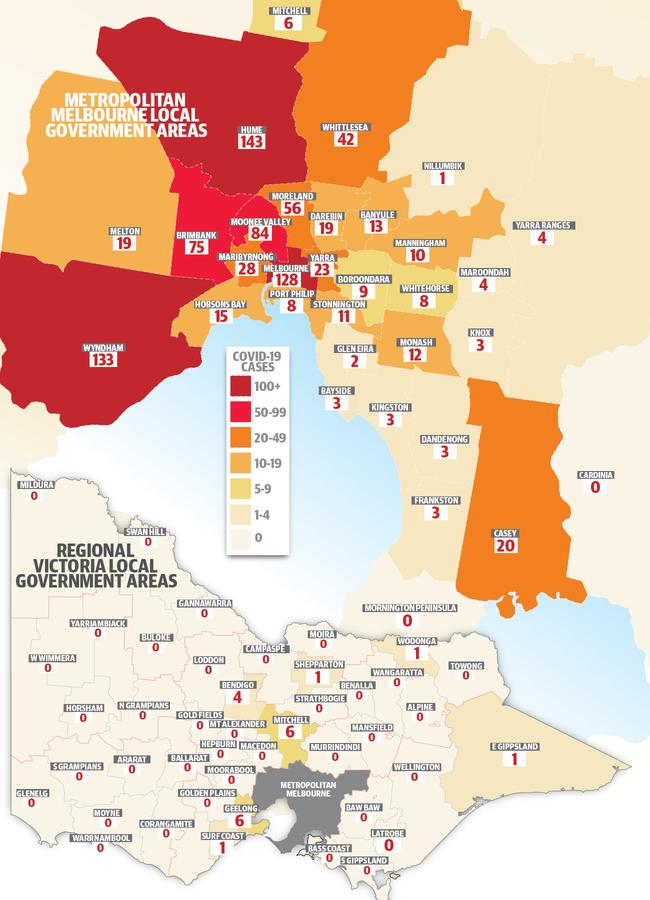
State Chief Health Officer Brett Sutton warned many store-bought masks were not suitable to protect against COVID-19 and urged people to make their own.
He said the government was working on a public education campaign about how best to do that.
“I think people will need masks but I don’t think there should be a rush on buying single-use masks, for example. In fact some masks purchased retail aren’t necessarily good for rewashing and reuse over days and days. We are working up communication materials that will give a bit of guidance about how to make a basic mask that can be rewashed that Melburnians and further beyond can use in several weeks to come.”
– Shannon Deery and Alex White
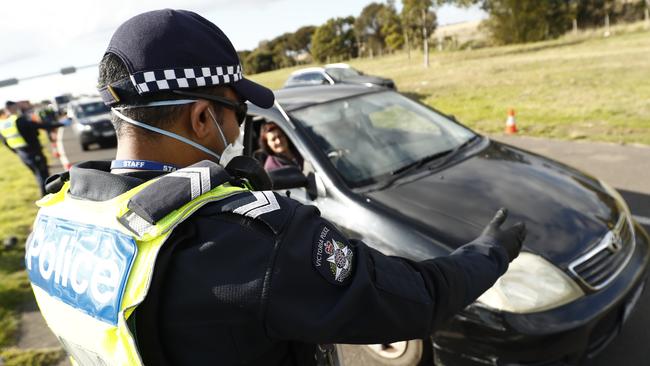
POLICE PRESENCE DOESN’T DETER
Police were out in force on the first day of lockdown pulling over cars and checking personal details, but many Melburnians still did not heed the warning, flocking to parks and piers and public spaces.
Multiple booze bus-style checkpoints were set up across Melbourne with about 200 checks carried out.
Officers were also using the latest technology scanning number plates.
However, despite the crackdown Police Minister Lisa Neville said some people were still not heeding the message.
In Mornington a large crowd of people gathered to watch whales and it was a similar sight at many beach locations around Port Phillip Bay.
But Premier Daniel Andrews warned people complacency would result in fines.
“We are deeply grateful for the people doing the right thing and I think that’s the majority of the people, but there will always be some out there who don’t and that’s why police are out there issuing those $1562 fines,” Mr Andrews said.
– Alex White and Chad Van Estrop
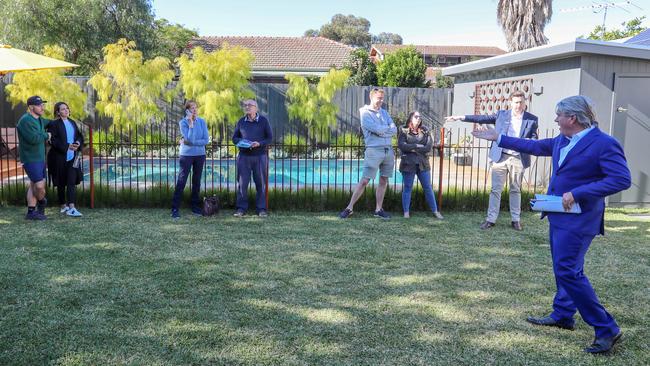
HOUSE PRICES WILL TAKE A BEATING
An almost $100,000 hit has been forecast for Melbourne home prices, with forced sales a potential outcome of the second COVID-19 lockdown.
NAB’s latest residential property survey tipped house and unit prices to plunge 7.3 per cent by the end of the year, with another 6.5 per cent decline expected in 2021.
The combined 13.8 per cent predicted fall is the worst outlook assigned to an Australian capital by the major bank, and equates to about a $94,000 drop for a median-priced dwelling worth $683,529.
Melbourne home values have fallen 2.3 per cent over the past quarter, according to property data firm CoreLogic.
NAB Group chief economist Alan Oster said the forecast was compiled before Premier Daniel Andrews announced a six-week second lockdown, reviving a ban on face-to-face auctions and open for inspections, but he stood by it.
“I suspect (the new lockdown) would make people feel even more nervous about what’s going to happen in Melbourne,” Mr Oster said.
– Samantha Landy
SMALL ENERGY FIRMS GET BREATHING SPACE
A rescue plan has been unveiled to prevent a “financial contagion” in Australia’s energy market that experts fear would see retailers collapse and power prices soar.
More than 1000 households and small businesses a week are seeking payment plans and hardship support with their gas and electricity bills during the coronavirus crisis.
This is threatening the viability of smaller retailers, which have promised not to cut off customers in financial strife but must still pay network charges to distribution companies so those people remain connected.
The Australian Energy Market Commission is now planning to allow smaller retailers to defer paying those charges for six months up until February next year.
AGL, Energy Australia and Origin will not be included in the scheme, with smaller retailers particularly vulnerable to non-paying customers.
For every $100 customers owe to their providers, $43 is payable to networks, $33 covers wholesale costs and $8 goes to environmental schemes, with retailers normally seeing a profit margin of just $4 per $100.
Commission acting chair Merryn York said the scheme would “help as financial reality bites for many people in the second half of 2020”.
“Normally the commission would regard retail players leaving the market as competition doing its job, but COVID is unprecedented — as are new requirements on retailers not to disconnect small customers who can’t pay their bills,” she said.
“If too many retailers go out of business because they can’t manage this financial risk, it would reduce consumer choice, could increase prices and even threaten people’s access to power.”
Retailers will be able to defer paying network charges for all residential and small business customers on payment plans, hardship arrangements and deferred debt processes.
The commission will lock in the scheme next month, with retailers to pay back all deferred charges by August next year. A 3 per cent interest rate will be charged but retailers cannot pass these additional costs on to customers.
– Tom Minear
BIG SPIKE IN CRISIS SUPPORT CALLS
Calls from Victorians to crisis support and suicide prevention service Lifeline are up 22 per cent since Sunday on the same time period last year.
Lifeline Chairman John Brogden said it was a sign Victoria’s second lockdown was already affecting people’s mental health.
“My message to Victorians is please don’t suffer in silence,” Mr Brogden said.
He said the service received almost 90,000 calls per month since March, or a call every 30 seconds. “So, this 22% spike in Victoria is a significant sign that the new lockdown measures are taking a toll on the mental health of Victorians.”
Mr Brogden said it was critical people that understood they could access services like Lifeline if and when they needed to.
“We want people to know they can call Lifeline on 13 11 14 at any time of the day or night or text us between 6pm and midnight every night on 0477 13 11 14.”
– Chad Van Estrop
